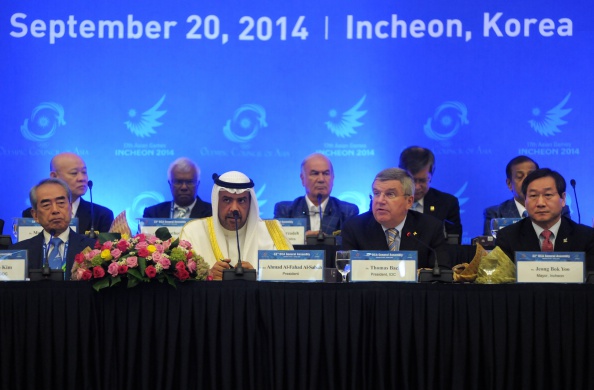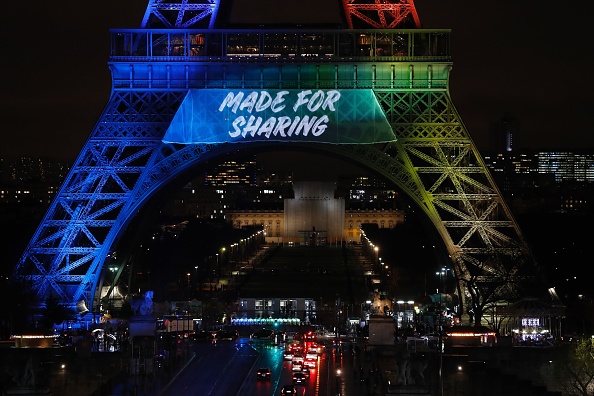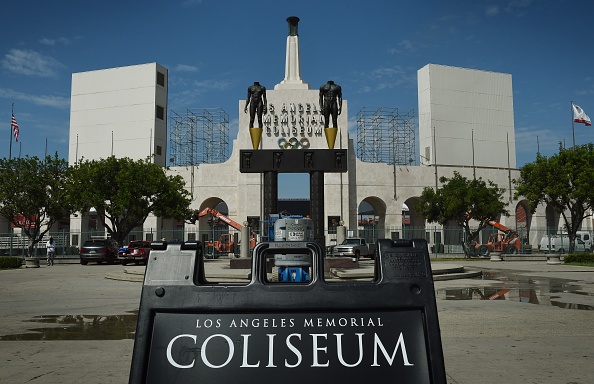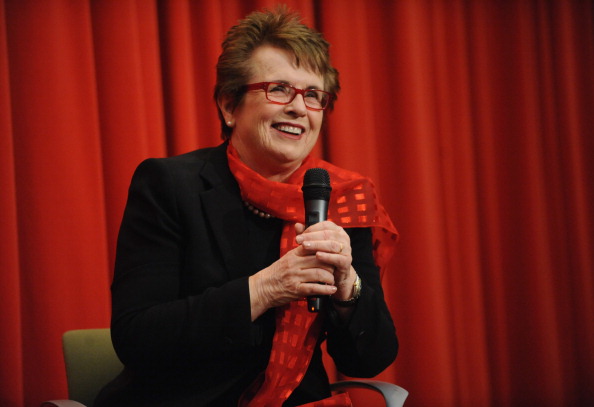The headlines are rich with stories about how sports and politics mix. This inevitably brings up the old fiction about how, especially in the Olympic scene, the two are supposed to be like church and state — separate and apart. That's a notion from way long ago. From a time when basketball players wore way shorter shorts.
Sports and politics mix all the time. Like gin and tonic. Hot dogs and hamburgers. Back and forth. Whatever.
A gentle reminder that in September 2014, the current International Olympic Committee president, Thomas Bach, in a speech at the Asian Games in South Korea, said that for sure sport and politics mix.
Sport needs to acknowledge its relationship to politics and business, Bach said in that speech. At the same time, he said, the world’s political and corporate elite must be mindful of the autonomy of sports organizations or run the risk of diminishing the positive influence that sport can carry.
“In the past,” Bach went on, “some have said that sport has nothing to do with politics, or they have said that sport has nothing to do with money or business. And this is just an attitude which is wrong and which we can not afford anymore.
“We are living in the middle of society and that means we have to partner up with the politicians who run this world.”
With that in mind, these, please:
—
A few days back, many track and field friends got so incredibly fired up over the Somali-born British gold medalist Mo Farah, arguably the greatest distance runner of our time, and his widely publicized, Nike-backed freak-out over whether he could get into the United States, when it turned out that a simple call to the British Foreign Office affirmed that of course he could.
Let us all now look forward to the learned observations of Sir Mo on Iran's announced ban on U.S. wrestlers.
Or perhaps it is only his own plight that he cares about?
Nike as well? And what it knows not only about its employees but, if not more important, what market research tells it about the demographics and voting inclinations of its customers?
In a staff email, Mark Parker, the chairman, president and chief executive officer of Nike, Inc., said he had been “moved” by the “powerful statement” that “Mo” — first name, as if everyone in corporate fun-world is the best of friends — “shared this morning.”
In that email, Parker went on to say, “Nike stands together against bigotry and any form of discrimination,” adding, “We’ve learned that on the field of play, where fairness and mutual respect are the rule, not the exception.”
That is of course a position to be commended.
Now, Mr. Parker, how far do those words reach?
Nike's business positions extend beyond the United States.
What, then, does Nike plan to do to stand up to the bigotry and discrimination of the Iranian regime? Or is standing up to bigotry and discrimination only a thing when it involves perceptions — that play to corporate image-making — of a certain Republican in the White House?
—
USA Wrestling statement on the reported Iranian ban:
“If these reports are true, USA Wrestling is extremely disappointed about this, which we believe would be an unacceptable situation. Wrestling is about competition and goodwill through sport, and is no place for politics.”
—
As for the reported Iranian action, and comparing it with President Trump’s executive order (and, by extension, Mr. Parker’s staff email):
1. Which governmental regime is using sport -- reasonable question: what other leverage does it have -- as retaliation?
2. Iran doesn't have an IOC vote so this means nothing for the Los Angeles 2024 Olympic bid.
3. Feel free, at any rate, to ask around IOC precincts about perceptions within the movement about Iran.
4. If you want to rail on Mr. Trump, go right ahead. At least in the United States, presumably you enjoy the right to free speech — that is, unless you’re in, of all places, Berkeley, California, and you have controversial matters on your mind.
At any rate, take a moment to look up all the episodes over the years in which Iranian athletes have not appeared or simply refused to engage with Israeli athletes because the Israelis are Jews and from an official Iranian perspective the Jews are scum and the state of Israel illegitimate -- and when they get back home to Iran from these sickening displays of seeking to delegitimize Israel and dehumanize its competitors, the Iranian athletes are typically welcomed as heroes.
In 2012, amid the London Olympics, the Iranian sports minister noted that “not competing with Zionist athletes is one of the values and sources of pride of the Iranian people and its athletes.”
5. Please read these two relevant paragraphs issued Friday by the Islamic Republic News Agency, referring to a statement from the Iranian foreign ministry:
"Islamic Republic of Iran will appropriately counter any measure threatening the nation’s interests, as it has suspended issuance of visas for the Americans in a tit-for-tat move against the US travel ban for the Iranians.
"The ministry also stressed that the Islamic Republic would not allow the ominous realization of the dangerous plots and delusions of the Zionist warmongers and their supporters."
6. Would it be reasonable to assert that the Iranians do not hold to the position that, when it comes to the Israelis, fairness and mutual respect are the rule on the field of play?
This case is obviously the exception.
Indeed, it flat-out amounts to bigotry and discrimination because the Israelis are Jews.
There is no other reason, no other explanation.
Sir Mo freaked out because of ill-conceived concerns he was going to be banned. The Iranians do not compete against Jews because of reprehensible, indefensible, indeed vile religious hatred as well as slanderous political opposition. The Iranians would seem, absent a reversal, to have actually moved to have banned the American wrestlers from their country.
Which, comparing apples and oranges, is worse?
So — where is the outrage over the Iranian action/s?
More — what is to be done?
—
They say that advice is worth what you pay for it. This advice is free. So here goes:
Time can work in the most intriguing way.
President Trump’s 90-day immigration-related executive order is due to expire in, oh, late April.
The International Olympic Committee’s evaluation commission visit to Los Angeles, in conjunction with the 2024 Summer Games campaign, is scheduled for April 23-25.
If it were me:
I would reach out to the White House and see if Mr. Bach, the IOC president, wanted to enjoy a White House visit with President Trump in, oh, mid to late April. Or if the White House was inconvenient, somewhere where the two leaders could meet. Maybe at the United Nations, which on the campaign last year didn't exactly seem like a Trump thing but is definitely a Bach hangout and is close to Trump Tower, where the new president has said the taco bowls are, you know, the best.
Wait. I hear the screaming from our French friends: "So unfair!"
OK, well, French president François Hollande and Bach got together for a face-to-face meeting in November 2013 in Paris.
And in April 2015 in Lausanne, Switzerland, the IOC’s base.
And, apples to apples, even during this 2024 campaign, in October 2016 in Paris, where Hollande presented Bach with a flag from the 1924 Paris Games and Bach said the “Paris bid is a very, very strong bid because of the unity and the large support it is sparking off,” adding, “Personally, I’m very impressed by the unity among both the sporting and political worlds.”
So — hope to see you soon in the United States, Mr. IOC President. If you get to the White House, and, a hand towel from the men's room, um, accidentally finds its way into your suit pocket and you leave with it as a memento of your visit, oh darn, we totally will understand. Barbara Walters and Meryl Streep, among others, have maybe collected some White House knickknacks, and Ms. Streep is even a Presidential Medal of Freedom of Winner. Again, Mr. IOC President, hope to see you soon.
—
Speaking of France:
The Paris 2024 bid on Friday launched the international phase of its campaign by revealing its new slogan, “Made for Sharing,” with co-chair Tony Estanguet saying in a statement that the tagline shows Paris “is a city welcome to ready the world,” adding, “We want to use the Games to break barriers and build bridges of understanding between communities and nations.”
Pause.
You can just hear the dialogue if not the cackling in the focus groups contrasting “bridges,” on the one hand, and “walls,” on the other, right?
Asked if the slogan was a rip on Mr. Trump, the French prime minister, Bernard Cazeneuve, told reporters Friday, “France has this idea of building relationships through the values of respect, fraternity and solidarity...
"It’s a very simple answer."
Uh-huh.
Class: we shall now examine France's colonial years, particularly but not exclusively in North Africa, and let us pay particular attention to the notion of "building relationships through the values of respect, fraternity and solidarity," with special regard to France's many Muslim constituents, and how those relationships continue to play out now, in our time, within France itself or in the way France is perceived within Europe and beyond.
The mayor, Anne Hidalgo, said in the same news release that Paris, “more than any other city, has embraced this culture of sharing and connection.”
Also Friday, French police shot and wounded a man who shouted “Allahu Akbar!” as he attacked them with a machete at the Louvre, the world’s most visited museum. Police sources told the British outlet The Telegraph that the assailant was a 29-year-old Egyptian who had arrived in Paris on January 26 after acquiring a one-month tourist visa in Dubai.
Hollande said, according to the newspaper, that the attack was “clearly an act of terrorism,” the latest that has put France in a "state of emergency" that has lasted now for nearly two years.
From the U.S. president:
https://twitter.com/realDonaldTrump/status/827499871011819520
—
Kudos. Applause. Way to be clever and think outside the boundaries, because this is exactly what the Olympic space needs, even if it's in the bid arena: something never, ever done in the 20 years I have been covering Olympic bids, which rigidly stick to the format of bid books and presentations.
Here is LA24 chair Casey Wasserman with part one of a series of "What's Not in the Bid Book!" He promises a look at stuff like best hikes in LA, where to buy cool sneakers -- and says, controversially, that Tito's Tacos, presumably the location in Culver City, California, offers the best tacos in town.
https://www.youtube.com/watch?v=MlrRRw0SbmE&feature=share
OK, so not perfect: I mean, what would you expect from someone who went to UCLA?
Advice to Wasserman as he builds his series, since most “in LA” stuff tends to revolve around the Westside, Downtown (which now goes by the trendy moniker ‘DTLA’), trendy spots like Los Feliz and Silver Lake and, of course, surfer and movie star hangout Malibu and the sprawl of the San Fernando Valley.
Check out the Roundhouse Aquarium at the end of the Manhattan Beach pier (free, kids of all ages love it) and the backside of the Palos Verdes peninsula (looks like Italy, locals only because it's way off the freeways).
There’s even a Golf Digest ‘top 100 public course’ way out there on the peninsula backside, with incredible views of the Pacific and Santa Catalina Island some 20 miles southwest of the mainland. The course is breathtakingly beautiful and has been featured in literally dozens of movies, commercials, TV shows and photo shoots.
It's Trump National.























